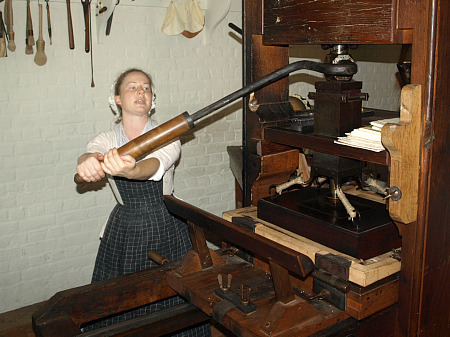My travels this summer have brought me to Washington, D.C. and Williamsburg, Va., where I’ve shown my California-dwelling kids some of the scenes of their nation’s birth. But while they’ve been seeing the sights from their U.S. history classes for the first time, I’ve also enjoyed revisiting some of the scenes of the American Revolution, for the perspective they’ve given me on the business and information revolution that’s now roiling the journalism industry.
My kids are big fans of the “National Treasure” films, so, like thousands of other visitors, we had to stop at the National Archives in Washington. While my kids rushed to see the Declaration of Independence (once we slogged through a 90-minute wait), I slid over toward the more legally profound Constitution, then spent the bulk of my time with the Bill of Rights.
As a journalist, I find it thrilling to look upon the original First Amendment (actually, “Article the third” on the document). Straining to see those famous words, now faded almost to obscurity on the page, I was reminded that their power draws not from their presence on that piece of paper, but from the affect that they had upon a new nation, and have to continued to have since.
Words fade from paper. Websites fall offline. Books are sometimes lost to the ages. But those works’ influence endures in the people that they affected – people who copy and reference and change their lives as result of the words that they read or heard.
That was the first lesson I took from my recent trip: That the power of journalism lies not in its presence on a printed page or on a website, but in the influence that it has upon the audience who reads it. We protect journalism not by restricting access to it, but by extending its influence by spreading its reach.
After visiting D.C., we drove down to Colonial Williamsburg, where we spent a day walking around the recreation of Virginia’s 18th-century capital city. Dozens of craftspeople make up the bulk of the exhibits there, and, predictably I suppose, I chose to spend the most time at the print shop.

A solitary young lady inked and, literally, pressed the day’s paper in a small shop, no more the size that three cubicles in a modern newsroom. There were no typesetters on duty that morning, though the young lady said that no more than two or three people would ever be working in the shop at a time, back in the day.
Watching the colonial press in action, it reminded me far more of what my wife and I do at home to put out a couple of websites, than what corporate news publishers such as Fox or Gannett do today to run their business empires. (And, by the way, those folks back in the day in colonial print shops made money and plenty of folks publishing in small online shops today are making money, as well. So let’s lay that counter-argument to rest, shall we?)
In the 18th century, the power of the corporation was the power of the crown. Corporations in colonial America were charted and sustained by the King of England. Frankly, given the power that modern corporations extend, through their lobbyists, over the writing and enforcement of U.S. law, not all that much as changed today.
Some modern journalism industry executives are fond of claiming that the journalism industry is the only one in the U.S. to enjoy constitutional protection, through the First Amendment. How wrong they are. The First Amendment’s freedom of the press did not endow corporations the right to make a profit, or protect their market share. Nor did it select a class of businesses to keep watch over others, something that they’ve too often failed to do, anyway.
The First Amendment instead endowed the people – individuals like those who worked the press in Williamsburg – the right to publish, and by doing so, to challenge their government and institutions, even corporations.
The words printed on that fading document in the National Archives retain their power only so long as individuals exercise the rights those words describe. As certain news publishers attempt to use the power of government to change the rules – to restrict access to information and the ability to publish and distribute it – others of us ought to remember the lessons of Washington and Williamsburg, and to raise our voices – in print, online and on air – to protect our existing freedom of publishing for individuals who wish to exercise it.









Great article. Thanks
Reading history will inspire wisdom